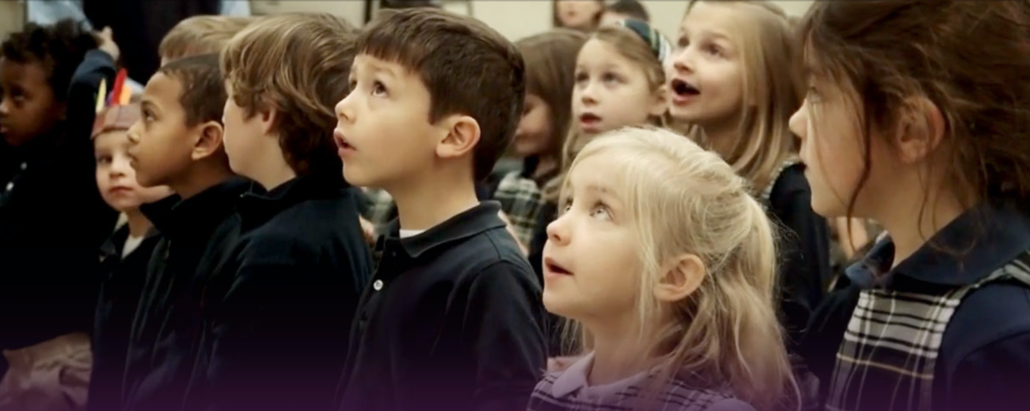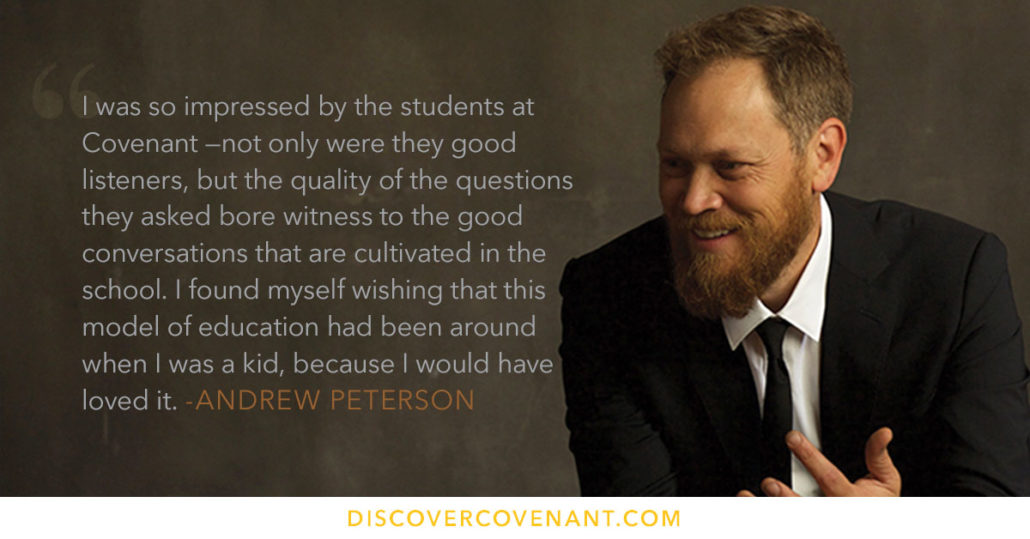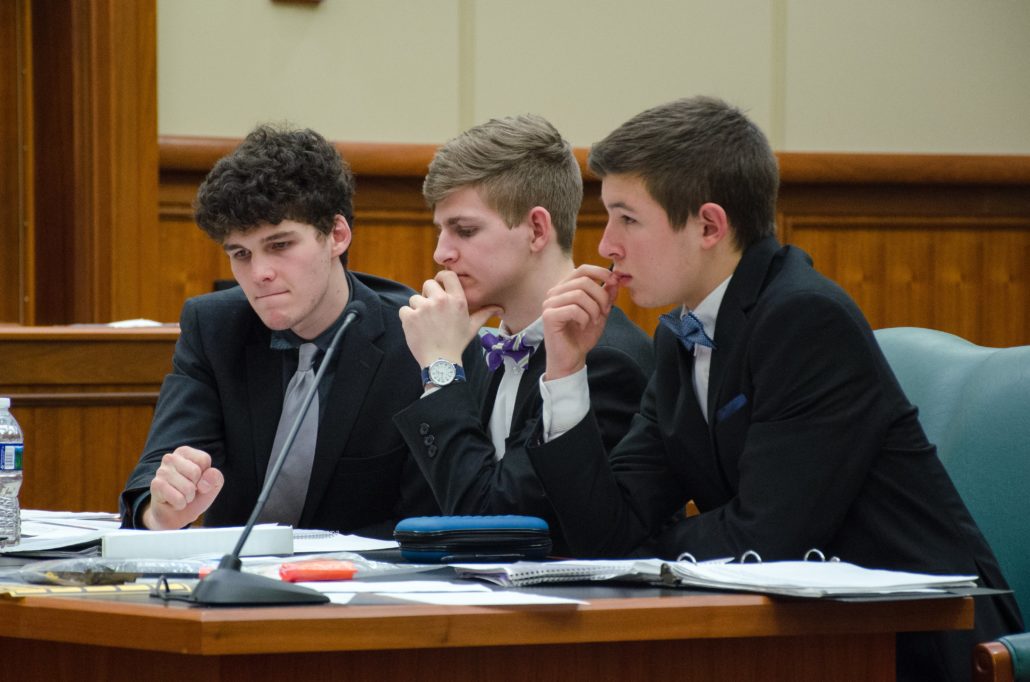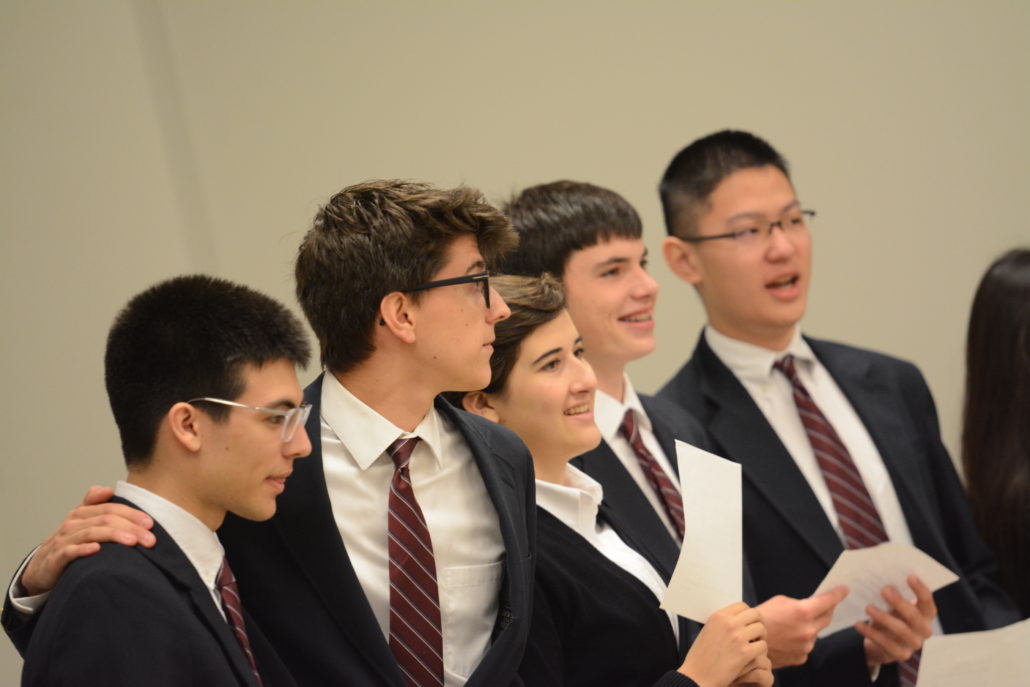Andrew Peterson and the Christian Imagination
In May of 2016 Covenant students enjoyed a visit from accomplished singer, songwriter, and author Andrew Peterson. While he is best known as a successful recording artist, Mr. Peterson has also won acclaim for his literary debut, a four-volume adventure epic called The Wingfeather Saga. (Click here for a great review of these books from Covenant’s former humanities teacher, Dr. Hunter). Peterson’s music and books bear evidence of a deeply Christian imagination reckoning with the world God made. He has also cultivated a community of storytellers and artists who come together at a place called The Rabbit Room to talk about and create art that is true and good and beautiful.
Mr. Peterson gave two excellent talks to our students during his visit. Covenant’s Head of School recently came across one of these recordings in his iTunes library. Remembering what excellent talks Peterson gave on the adventure of reading and on the formation of a Christian imagination, we thought parents and students would be blessed to hear them. So, here you go.
The Adventure of Reading (to Grammar School Students)
The Christian Imagination (to Upper School Students)
- The questions asked from the audience were unfortunately not picked up on the recordings. We have lightly edited the recordings to take out some of the longer gaps and pauses. The listener should understand that Andrew was responding to questions, not simply jumping from topic to topic.
Conversation with Greg Lowe
At Covenant we believe strongly in the the God-given authority and duty of parents to raise up their children in the Lord. We want to partner well with parents in this task, and we depend upon their wisdom and commitment in the education of their children.
In this conversation, Greg Lowe shares his thoughts reflecting upon his nearly two decades in the Covenant community. Greg and his wife Jennifer have raised four sons – all of whom went Kindergarten through graduation at Covenant. Greg has served in numerous ways at Covenant over the years, heading up the building committee that located and then helped to renovate our current campus, leading as a board member, and coaching varsity basketball.
In this conversation recorded at Classical Academic Press, Greg discusses various facets of Covenant, including their decision to come to Covenant initially, the importance of athletics in classical education, the skill of being able to learn new things, and the distinctive camaraderie they found in Covenant’s community. See the time stamps below to learn more about a specific topic.
- From Home School to Christian School | 0:00 – 0:51
- Athletics and Classical Education | 0:52 – 2:59
- Community and Faculty-Student Interaction | 3:00 – 4:14
- Cultivation of Thought and Creativity | 4:15 – 8:09
The Verdict Is In
One of the distinctives of a classical education is an emphasis on training in logic and rhetoric. Learning to think and speak well serves our students for their whole lives in whatever calling they pursue. A cadre of our Upper School students experienced a tour de force in these matters under the tutelage of two experienced U.S. attorneys who pioneered Covenant’s first ever Moot Court elective.
Gordon Zubrod was a captain in the Marine Corps before going on to serve over three decades as an Assistant U.S. Attorney and Senior Litigation Counsel for the Department of Justice. His career included the investigation and prosecution of organized crime, political corruption, human trafficking, money laundering, and complex white-collar crimes. He was joined by Stephen Cerutti, an Assistant State’s Attorney for the Middle District of PA who specializes in criminal appeals. He is also a father of a Covenant student.
Together they gave our students a 10 week course in constitutional law, trial procedure, rules of evidence, cross examination, and other facets of America’s legal system. Their razor sharp reasoning and decades of experience helped students to hone their logical skills as they prepared their cases.
The elective came to a dramatic conclusion on February 22nd when the students presented their cases before Chief Magistrate Judge Martin Carlson in his court at the Federal Building in Harrisburg. The students were dealt a difficult fact set fraught with constitutional and ethical challenges requiring careful reasoning and analysis. The facts were borne out of Zubrod and Cerutti’s many years of experience and imagination, giving the students a challenging yet true to life case to try. The students performed all of the major roles for the trial, serving as a prosecution team, defense team, and witnesses. (Then the roles were switched around for round two).
It was exciting to watch the students rise to the occasion, answering questions and responding to challenges before the gaze of the jurors (their parents and Head of School) and the formidable presence of Judge Carlson. The students acquitted themselves well. Judge Carlson went out of his way to complement their achievement in his closing remarks:
You should be very proud of the work you have done in this courtroom. The work you have collectively done vastly exceeds the quality of the work that I see from seasoned litigators on a daily basis. . . You have done an exceptional job of presenting very complex constitutional issues, and you and your families and the school should be very proud of the work you’ve done here.
The course also made a powerful impact on the students as they learned about the freedoms and rights we enjoy as citizens of our constitutional republic. One student remarked that,
It is so easy to distance oneself from the criminal activity that occurs very close to us all, and this elective made me realize how relevant our constitutional rights are and how important it is to understand the system dedicated to protecting the American citizens.
We are grateful that these students had such a wonderful experience through this elective this year.
Litigators Jason Bryce, Brett Montefour, and Ben Snyder deep in thought.
Voices of Gratitude: Student Perspectives on Covenant
At our 20th anniversary banquet in November we asked both a current and former student to share about “what I am thankful for about my classical education at Covenant.” We thought their speeches were worth sharing again as they well describe many of the things we thank God for at Covenant.
Lucas Lanza: The Joy of Fellowship
I thought about what I would share with you all here for a while, because I really do owe so much to Covenant Christian Academy. I’ve attended Covenant for a little over 12 years so there’s a lot to be grateful for. I thought about critical thinking, social skills, and art, but in the end I decided I would share my gratitude for an equally important take away from Covenant.
I owe my love and desire for fellowship to Covenant. Obviously, everybody enjoys time spent with friends, but I would make the distinction between that time and my idea of fellowship. To me, fellowship is a time when believers come together and talk with one another about their walks with Christ, what they’re grateful for, and their struggles. It’s a yearning for this kind of interaction that Covenant has implanted in me. Many of my classmates have been at Covenant since kindergarten, we’ve matured together and experienced many of the same struggles throughout our young lives, so I find it extremely rewarding to fellowship with them. As I’ve grown older, I’ve been able to grow much closer to my friends in this way. As Covenant has encouraged us to engage the word in more depth, I have been able to think about my life and my faith with the same depth, and I’ve observed this in my friends as well.
As well as encouraging this idea of fellowship in me, Covenant also provides a number of great opportunities for fellowship. Various activities during the day, such as hallway liturgies, lunch, and class discussions, as well as extra curricular activities like sports are great environments for this kind of Christian interaction. For me, a fantastic fellowship opportunity was opened when I joined the Covenant soccer team.
Personally, this past soccer season, my final season, was an incredibly formative experience that I shared with a really solid group of guys. Despite how short and mildly depressing this season was, it actually was an incredibly positive experience compared to its preceding years, and it was really exciting to see how God worked through us during the good times and the hard ones.
I feel this same excitement when I think about my future. In a couple of months my high school journey will come to an end and I’ll be shipped off to college. I’ll be in an entirely unfamiliar place filled with new people, but I rest assured knowing that because of Covenant I have what it takes to glorify God in this new place. And that I have made lasting relationships with people who I can rely on for fellowship during hard times even if they are far away. I’m eternally grateful for the skills that Covenant has given me that I know will be useful for the rest of my walk with Christ. Thank you, God bless.
Erin Burlew: Thinking and Conversing Well
Good evening! For those of you who don’t know me, my name is Erin Burlew. I graduated from Covenant, or more affectionately known the to alumni as CCA, in 2010 and work in public accounting in Richmond, Virginia.
It’s been wonderful to see so many familiar faces tonight. Some of you might remember one of the last times I spoke at Covenant, though probably not as vividly as I do, a nervous 18 year old dressed in a plaid skirt presenting my senior thesis hoping the board would be gracious with their questions and critiques.
I’m astounded that that day was almost 8 years ago. At that point I could never have anticipated being asked to stand here today, celebrating twenty years of this school.
In line with the theme of this evening, I was asked to share with you what I am grateful for about Covenant. But the evening is too short to truly convey all the gifts my time here provided. I could tell stories from the good old days of Covenant for hours, but for the sake of time I’ve chosen two elements of my education for which I am particularly thankful that continue to impact my daily life, both in and out of the workplace.
Covenant was the place where I was taught to think and was taught to converse.
Now, certainly CCA was not my only classroom for these. In fact, I primarily learned to think and converse at home. But school often felt like an extension of home, partially because of my family’s involvement, but also because the values which were taught at CCA aligned with what I learned at home. Learning was always part of life in the Burlew household.
But the classrooms of CCA provided the formal setting in which I discovered how to learn and how to follow my curiosity. Of course, by learning, I mean so much more than memorizing facts. I learned how to think, to problem solve, to ask good questions, to read critically and evaluate teaching. Our teachers answered questions with questions to lead us to conclusions and taught us to defend positions with valid arguments.
These skills have served me well – not only during my time at Grove City College, but also in my career.
I know that accountants don’t have the most exciting stereotype. I can’t say that I ever dreamed of being an auditor growing up, but I’m thrilled to have found a career that uses my skills and encourages both personal and professional growth.
At its roots, my job involves learning about an organization – from the big picture down to the small details. We make conclusions about how facts affect money. In this way we are able to evaluate our client’s accounting records. What it really looks like is asking “Does this make sense?” many times throughout the day. This question is one that I learned to both ask and answer in logic and rhetoric class at Covenant.
I’ve used these skills in all areas of life, not just my career. Since leaving my parents’ home after high school, I first moved to Grove City for college, back to Harrisburg after graduation, and finally to Richmond. In each of these stages of life I’ve entered into a new community and searched for a new church. This isn’t a situation I was directly taught to handle. There was no class for how to move to a new city and find a church. But because I learned how to think, to read, and to listen critically, I’ve been able to apply these skills in evaluating the teaching and theology of a new church.
The second element of a CCA education that I am grateful for is my ability to converse.
Accountant’s aren’t generally known for conversation skills. In fact, when I explained my job, some of you probably pictured me crunching numbers on a calculator alone in a dark windowless room. But knowing how to have challenging conversations is a critical part of an auditor’s role. There were several times as a recent college graduate where I needed to challenge a [decision made by a] client’s CFO. To say that these conversations are intimidating is an understatement.
But walking through life avoiding intimidating conversations is what creates adults more equipped to spout off a disagreement on social media than work through an issue in real life. CCA makes students face these conversations head on, in an environment that encourages speaking the truth in love, an environment that doesn’t equate being respectful with being in agreement. We not only had classroom debates with fellow students, but visited a mosque, a hindu temple, and other religious sites in apologetics class, enabling us to have an educated view of other religions. We learned to see those in disagreement as people to be loved, not enemies to avoid.
To think and to converse are behaviors that all humans engage in. But to think and to converse well are honed skills, that must be trained and ingrained over time as a partnership between teachers and parents. I consider it an honor to have been educated in a school that put more effort into these disciplines than in scores on standardized tests or acceptance rates to prestigious universities. However, many who attend CCA are blessed with the opportunity to continue on in their education, as I was. I made my way from the halls of CCA to the halls of Grove City College.
This leads me to my second reason for standing here tonight, to introduce the main speaker for the evening, Mr. Paul McNulty. Prior to returning to Grove City as President, Mr. McNulty worked as an attorney in Washington D.C., including holding the position of Deputy Attorney General. Many of his other impressive accomplishments are listed in tonight’s program. As a Grove City alum, I think of President McNulty as the one who tirelessly leads Grove City College as it provides a liberal arts education to young adults. He is much beloved by faculty and students alike.
It is my profound honor to introduce to you the Honorable Paul McNulty.
Well Suited for Joy
Students pass beneath a beautiful stained-glass window each morning as they walk into school. The glass was crafted by fellow classmates, teachers, parents, grandparents, and friends over the course of two years before being installed in September 2016. It is a reminder that students are entering into a different kind of place – a school where beauty surrounds us, where the sound of singing is oft heard, and where a love for learning is cultivated. Classical Christian education is meant to be a joyful education, filled with discovery, delight, and friendship.
Susan Wise Bauer once said,
Because it uses real, living books and hands-on experimentation rather than relying on textbooks and canned presentations, classical education is a matter of exploration, of reading, thinking, and talking and of discovery – not of rote memorization and regurgitation.
For those with questions like, “isn’t classical education too structured?” or “doesn’t all the memorization take away the joy of learning?” all I can say is, come, taste and see the fruit. Here are four ways that classical education at Covenant is suited to bring joy to your child’s life.
Delight in Discovery
Though much of modern education and life serves to deaden this instinct, children are filled with a natural curiosity and wonder of the world. At Covenant, we want to respect the image of God in our students in this way.
A. G. Sertillanges recognized this fact by saying,
Every intellectual work begins by a moment of ecstasy; . . . Now what is this ecstasy but a flight upwards, away from self, a forgetting to live our own poor life, in order that the object of our delight may live in our thought and in our heart.
We want our students to marvel at the fall colors. To wonder at the metamorphosis of the caterpillar into a butterfly, to stand awestruck at the moon eclipsing the sun, to dream of where the geese fly in the fall, to ponder triads in music and in nature. This delight in discovery is at the heart of a classical education at Covenant.

.
Overcoming Obstacles Together
Not much worthwhile in life comes easy. Teddy Roosevelt stated the idea like this:
Nothing in the world is worth having or worth doing unless it means effort, pain, difficulty. . . I have never in my life envied a human being who led an easy life. I have envied a great many people who led difficult lives and led them well.
Yes, of course, classical education is hard at certain points. We are seeking to turn boys and girls into courageous and wise men and women. It’s a challenging road, and that’s why it’s so important that our students learn in a community where this effort is honored by their teachers and peers. These habits and skills must be learned by each individual, but not alone. Our students learn and grow with other students facing similar challenges, and taught by teachers who love Jesus and who want what is best for them. This friendship makes all the difference.
A Living Curriculum
One of the best things that we give to our students at Covenant is our teachers. Teachers who love Jesus, who love their students, and who love what they teach. Listen to how John Milton Gregory described the excellent teacher a century ago:
He must ever be a cold and lifeless teacher who only half knows the lessons he would teach; but he whose soul has caught fire from the truths which he carries, glows with a contagious enthusiasm and unconsciously inspires his teachers with his own deep interest.
We are blessed to have teachers who embody a love for learning and teaching. Having consistently seen their Christ-like character, I am thankful that my children are being shaped and formed by Covenant’s teachers. Gregory describes what happens when a school is filled with teachers like this:
There will come to our schools an attractive charm which would at once increase their numbers and double their usefulness. The school-rooms, now so often dark and dull, would glow as with a living light, and teachers and pupils, instead of dragging to their weary task, would hasten to their meeting as to a joyous feast.
Inheritors of Freedom
The ultimate goal of our education at Covenant is the formation of our students into young men and women who love God with all their heart, soul, mind, and strength. But who is able to do this? To love God rightly, to have affections ordered toward their proper end, to seek what is good and beautiful, and to turn away from what distracts and diminishes glory – this takes training in the Spirit.
A classical education is designed to answer the question Anthony Esolen asks in Life Under Compulsion:
How to raise children who can sit with a good book and read? Who are moved by beauty? Who delight in innocence? Who can walk outdoors and enjoy the beauty of weeds and sparrows? Who still possess youth, which lends them both a frolic childlikeness and a wisdom beyond their years? Who have no compulsions – who don’t have to attend to the constant buzzing of a smartphone, or click on the next link and the next link and the next link, or buy the latest gadget, or submit to the instant urge?
He answers the question this way:
To resist Life Under Compulsion, to raise children who can throw off the shackles and enjoy truly free, and full, lives, we must affirm the old meaning of the English word free, which is related to joy and greatness of heart . . .
But what is it to be free? How do we cultivate this outward-looking freedom that sets our hearts toward what is good and beautiful? The answer is what a wise pastor once called the “expulsive power of a new affection.” We will not, and our students will not, undertake the hard work of saying no to lesser things – at least not for long – until we are gripped by the beauty and goodness of something greater. “To free oneself from the accumulated sludge of sin,” Esolen writes, “is to free oneself for the freedom of heart that is love.”
Parents choose the challenge of classical education because they want their children to learn to know this freedom. There is an easier road, for sure:
. . . you may wish to raise up Contented Cows, placidly chewing their cuds in a field of creature comforts, or Harried Hamsters, racing on the Mill of the World. . . . The chains are right here, if you like.
Yet so is the window.
Although it is not as easy or “fun” as other roads, there is much joy on the journey to be had. And what is more – there is a harvest, for those who faint not. (Gal 6:9).
Covenant Christian Academy
1982 Locust Lane
Harrisburg, PA 17109
Office Phone: 717-540-9885
Office Fax: 717-540-7176














